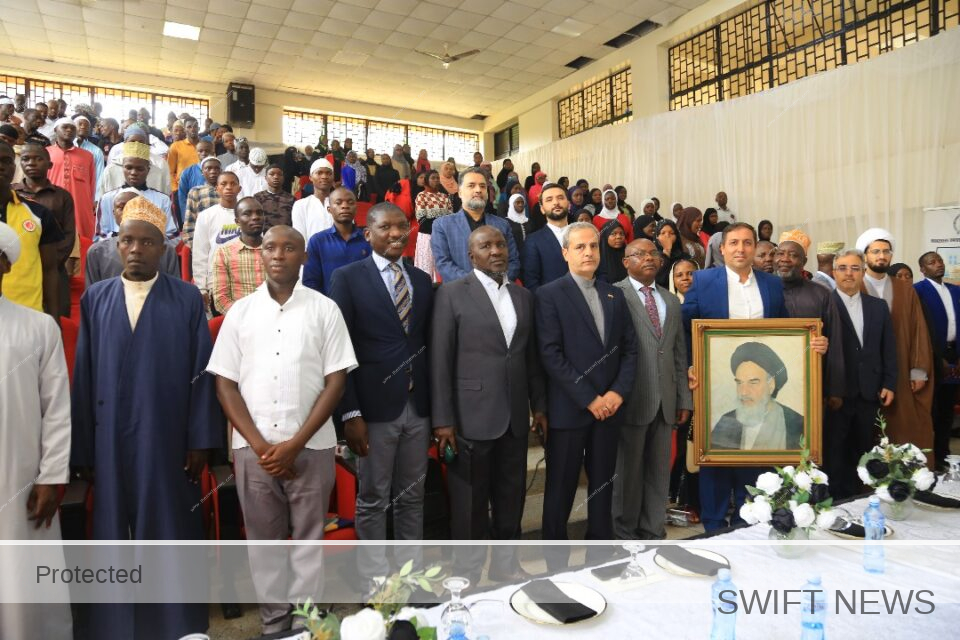
By Our Reporter
Makerere University Business School (MUBS) recently hosted a solemn and intellectually engaging commemoration of the 36th death anniversary of Ayatollah Imam Ruhollah Khomeini, the founder of the Islamic Republic of Iran. The event brought together diplomats, religious leaders, academics, and students to reflect on the legacy of one of the most influential figures in contemporary Islamic history.
The function was moderated by Hon. Issah Katungulu Luyimbaazi, the African Youth Ambassador, and was graced by several distinguished guests, including His Excellency the Deputy High Commissioner of the Kenya High Commission, Mr. Namuguzi from UNICEF-NPC, and his delegation. Also in attendance were Hon. Asuman Basalirwa, leader of the Parliamentary Muslim Caucus in the Parliament of Uganda; Dr. Rouhollah Dehghani, Principal of Al-Mustafa Islamic College; Sheikh Muhammad Ali Waiswa, Deputy Mufti of Uganda; Dr. Faridah Kyambadde, representative of the Islamic University in Uganda (Females Campus); Dr. Ahmed Walugembe, Head of Marketing and Media Studies at MUBS; Dr. Celestine Katongole, Head of the Tourism Department at MUBS; Dr. Owen Kembabazi, lecturer at MUBS; Dr. Assadi, lecturer at Al-Mustafa Islamic College, Kyengera; and Sheikh Jamil Nsubuga, Deputy Imam of MUBS.
Educational institutions represented included Excel Vocational Training Centre, Metropolitan International University, Markazi Imam Reza (Kiteezi), Swadiq Centre (Luwafu), MUBS, and the Islamic University in Uganda (Females Campus).
The event began with an opening prayer led by Sheikh Buye Hussein, a teacher at Imam Reza School. Dr. Ahmed Walugembe, representing the Principal of MUBS, welcomed the guests and highlighted the growing collaboration between MUBS and the Iranian Embassy. He praised the late Imam Khomeini for fostering Iran’s diplomatic and educational ties with African nations and reiterated the school’s commitment to future academic and cultural exchange programs with Iran.
Dr. Celestine Katongole recounted his recent visit to Iran with a team of Ugandan academicians, noting that the image of Iran portrayed by Western media sharply contrasts with the organized, culturally rich, and technologically advanced society he encountered. He emphasized the need for Ugandan traders and scholars to engage more with Iran.
Dr. Owen Kembabazi, who represented Uganda and Africa at the International Women’s Congress at Al-Zahra University in Iran, encouraged more cultural and academic exchange initiatives, particularly focused on women’s issues.
Dr. Assadi of Al-Mustafa Islamic College emphasized the scholarly legacy of Imam Khomeini, referencing Quranic teachings on the prophetic mission of resisting tyranny. He praised Imam Khomeini’s vision of Islamic unity, awakening, and Islamic democracy, which laid the foundation for Iran’s Cultural Revolution.
Sheikh Muhammad Ali Waiswa, the Deputy Mufti of Uganda, underlined the importance of commemorating such legacies to inspire commitment to justice, knowledge, and development. He noted Iran’s technological self-sufficiency and its unwavering support for Palestine in the face of global adversity, hailing Imam Khomeini’s legacy as one that challenged both Western and Eastern dominance to forge a uniquely Islamic governance model.
Hon. Asuman Basalirwa shared personal reflections on leadership, drawing from Imam Khomeini’s example of combining religious conviction with political acumen. He praised Iran’s infrastructural development despite economic sanctions and called on Ugandans to reject propaganda and embrace a spirit of self-reliance and simplicity, hallmarks of Imam Khomeini’s leadership.
Mr. Abdollah Abbasi, the Iranian Cultural Counsellor, emphasized that Imam Khomeini’s contributions transcend Iran, continuing to inspire global believers and free thinkers. He noted Khomeini’s role in drafting a people-centered constitution and his declaration of Quds Day during Ramadan as a symbol of solidarity with oppressed nations.
In his keynote address, H.E. Mr. Majid Saffar, Ambassador of the Islamic Republic of Iran, reaffirmed Imam Khomeini’s enduring legacy as a voice for the oppressed and architect of a governance system rooted in Islamic principles. He condemned Israel’s aggression in Palestine and reiterated Iran’s readiness to collaborate with countries of the Global South in areas such as science and technology. Citing Imam Khomeini, he urged participants to stand firm against corruption and injustice while promoting peace and human dignity.
The commemoration concluded with a strong message of unity, intercultural dialogue, and the shared responsibility of scholars, leaders, and citizens to uphold values of justice, knowledge, and solidarity—principles that Imam Khomeini championed throughout his life.

